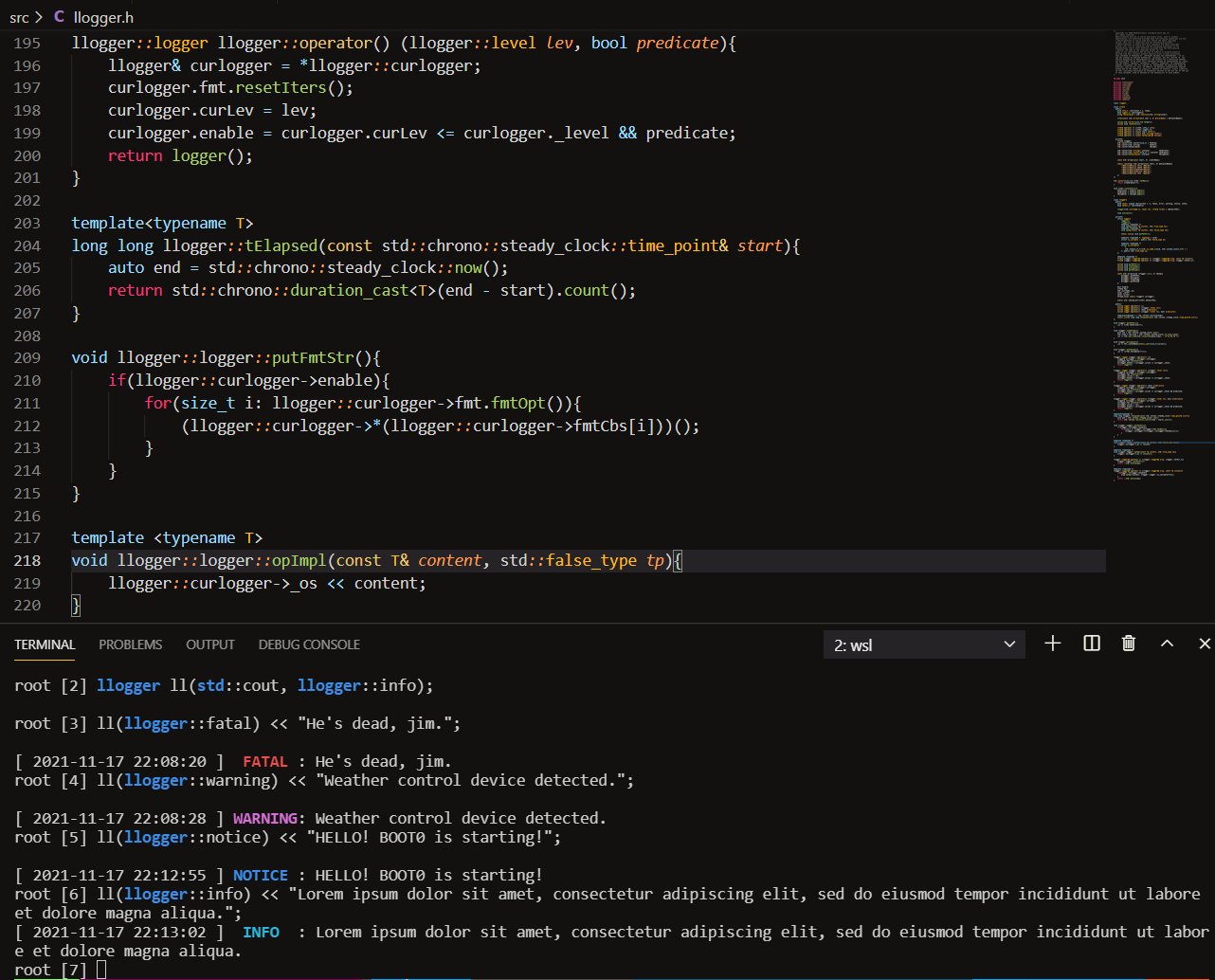Lightweight, fully-customizable log library for C++17.
Highlights
- Standard streams style operations
- Fully customizable message format with simple interface
- Level and predicate based conditional logging
Quick Start
#include "llogger.h"
llogger ll(std::cout, llogger::info);
ll(llogger::warning) << "Weather control device detected.";
// [ 2021-10-04 22:40:47 ] WARNING: Weather control device detected.
Conditional Logging
Values in the log are costly to be evaluated sometimes, or the log at low severity level is too lengthy. In these cases it would be nice to disable specific log accordingly. Lite logger supports two categories of conditions: severity levels and bool expressions.
Lite logger has 5 predefined severity levels:
fatalerrorwarningnotice, andinfo
You can augment or modify them easily with slight changes in source code.
The severity level of the message is designated by the first parameter passed to the instance of llogger, and messages with level lower than the enabled level are not logged. The enabled severity level is initialized with the second parameter in the llogger constructor:
llogger ll(std::cout, llogger::error);
ll(llogger::warning) << "Weather control device detected.";
// Nothing is printed
If the severity level of the message is not provided, the severity level of the previous message is used.
A bool expression can also be passed to the instance of llogger. If it is evaluated to false, the following message is not logged:
llogger ll(std::cout, llogger::error);
ll(1 < 0) << "Weather control device detected.";
// Nothing is printed
The bool expression can be used together with the severity level, and the later is always passed first:
llogger ll(std::cout, llogger::warning);
ll(llogger::warning, true) << "Weather control device detected.";
// [ 2021-10-30 22:34:04 ] WARNING: Weather control device detected.
Expressions in the message body are always evaluated before the body is passed to the logger. This is enforced by the semantic of C++ language. To defer the evaluation of expressions, they have to be wrapped inside a lambda (or any callable). They will not be evaluated unless the logging conditions are met:
llogger ll(std::cout, llogger::warning);
ll(1 < 0) << []{return "This is not going to be evaluated!";};
// Nothing is printed
Message Format Customization
Lite logger provides extreme flexibility in customization of message format via the llfmt class, which has the same stream operation style as llogger. llfmt supports 5 types of message segments:
llfmt::levelrepresents the severity level of this messagellfmt::timerepresents the time this message is loggedllfmt::logStrrepresents the message textstd::function<std::string ()>allows functions returning astringto be evaluated during logging, and the returned value is insertedstd::stringis the static text in the message format
The default format is initialized as a static member of llogger. The explicit process of creation and using it to initialize a llogger is:
llfmt lfmt;
lfmt << "[" << llfmt::time << "] "
<< llfmt::level << ": "
<< llfmt::logStr;
llogger ll(std::cout, llogger::info, lfmt);
// The format is
// [ yyyy-mm-dd hh:mm:ss ] LEVEL: Message.
llfmt::logStr and llogger::fmtStr allows interleaving the format text with the message:
llfmt lfmt;
lfmt << "format text0 "
<< llfmt::logStr
<< "format text1 "
<< llfmt::logStr;
llogger ll(std::cout, llogger::info, lfmt);
ll(llogger::warning) << "Message 0 " << llogger::fmtStr << "Message 1";
// format text0 Message 0 format text1 Message 1
Functionalities like a counter are easy to be implemented with a function in the format:
llfmt lfmt;
int cnt = 0;
lfmt << "[" << []{std::to_string(++cnt);} << "] "
<< llfmt::level << ": "
<< llfmt::logStr;
llogger ll(std::cout, llogger::info, lfmt);
ll(llogger::warning) << "Message 1 "
// [1] WARNING: Message 1
ll(llogger::warning) << "Message 2 "
// [2] WARNING: Message 2
License
No license.
Rather than a mature logging library, this project is more of a demonstration of the ideal interface of a logging library for C++ in my conception. It is heavily inspired by glog but incorporates no macro to implement fancy features like conditional logging. Huge feature gap is yet to be filled to make it a complete library, but if you want to embedd it to your project, please feel free to do it :)
